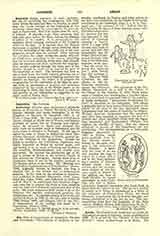

Aspilcueta, MARTIN (also AZPILCOETA), generally known as Navarrus, or Doctor Navarrus, a famous Spanish canonist and moral theologian; b. in the Kingdom of Navarre, December 13, 1491; d. at Rome, June 1, 1586. He was a relative of St. Francis Xavier, studied at Altar, and in France, and became professor of canon law at Toulouse and Cahors. Later, he returned to Spain and occupied the same chair for fourteen years at Salamanca, and for seven years at Coimbra in Portugal. At the age of eighty he went to Rome to defend his friend Bartolomeo Carranza, Archbishop of Toledo, accused before the Tribunal of the Inquisition. Though he failed to exculpate the Archbishop, Aspilcueta was highly honored at Rome by several popes, and was looked on as an oracle of learning and prudence. His humility, disinterestedness, and charity were proverbial. He reached the patriarchal age of 95, and is buried at Rome in the national Church of San Antonio de’ Portoghesi. Among other lives of Aspilcueta there is one by his nephew, prefixed to the Roman edition of his works. His “Manuale sive Enchiridion Confessariorum et Penitentium” (Rome, 1568) originally written in Spanish, was long a classical text in the schools and in ecclesiastical practice. In his work on the revenues of benefices, first published in Spanish (Salamanca, 1566), translated into Latin (1568), and dedicated to Philip II and St. Pius V, he maintained that beneficed clergymen were free to expend the fruits of their benefices only for their own necessary support and that of the poor. He wrote numerous other works, e.g. on the Breviary, the regulars, ecclesiastical property, the jubilee year, etc. A complete edition of his works was printed at Rome in 1590 (3 vols. fol.); also at Lyons, 1590; Venice, 1602; and Cologne, 1615 (2 vols. fol.). A compendium of his writings was made by J. Castellanus (Venice, 1598).
THOMAS J. SHAHAN

